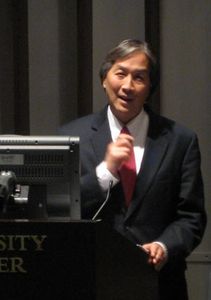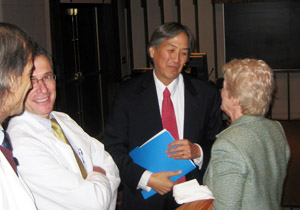Koh Tells BU Colleagues: Health Reform Will Improve Prevention
Many Americans are focused on the insurance regulation aspects of healthcare reform — who will be covered, for what, and when.

Not the case for Howard Koh, a Boston University School of Public Health (BUSPH) graduate and former faculty member of BUSPH and Boston University School of Medicine who is now assistant secretary for health in the U.S. Department of Health and Human Services. What Koh sees in the Patient Protection and Affordable Care Act, signed into law by President Obama in March, is an aspect of healthcare that has interested him since he was a young clinician at Boston City Hospital 30 years ago, and later a professor at BUSPH: Prevention.
“In 1985, I taught a course on cancer prevention at BUSPH, with [epidemiology professor] Marianne Prout,” Koh told a packed lecture hall Nov. 1, as he visited the medical campus to deliver the first Howard K. Koh Visiting Professor Lecture, hosted by the BU School of Medicine Department of Dermatology. See the video here
“I remember some people saying, ‘Cancer prevention? That’s an oxymoron.’ [But] I was determined to make prevention come alive.”
Now, after years in which prevention was “not even mentioned,” he said, “It is front and center in the Affordable Health Care Act.”

Koh described his own circuitous journey to the Health and Human Services post with humor and humility, recalling the advice of his late father, who had urged him to “Be broad, like the sky.” He spent much of his early clinical career caring for patients with preventable illnesses, including those caused by smoking. He said he remembers thinking, when he could not cure a disease that could have been prevented, “There’s got to be a better way.” Those thoughts fueled his interest in prevention, as both a physician and as former commissioner of public health for the Commonwealth of Massachusetts, from 1997 to 2003.
Koh said his new position has “united the worlds of medicine and public health,” at a time when those two areas are converging in the federal reform effort. For all the language about insurance coverage in the new legislation, he said, there is also a strong emphasis on prevention programs. Among the initiatives is the establishment of a National Prevention, Health Promotion, and Public Health Council, and a new Prevention and Public Health Fund, with an annual appropriation that begins at $500 million in fiscal year 2010 and increases to $2 billion in fiscal year 2015.
Koh, who was honored with a BU Distinguished Alumni Award, said he was hopeful that the country would make headway during his tenure in reducing obesity and tobacco consumption — two areas of continuing concern. He recalled the frustrations of treating patients at the former Boston City Hospital (now Boston Medical Center) who were wrestling with alcohol and substance abuse problems, poverty and lack of insurance.
“I feel my journey is starting all over again,” he told the crowd of medical campus students and faculty, many of whom he had worked with over the years. He said serving as the “ASH,” as the assistant secretary for health is dubbed, “is just an incredible privilege.”
Koh, who spoke in the Keefer Auditorium in the BU School of Medicine, said he was honored and overwhelmed to be “back in this room where I spent literally 30 years,” listening to lecturers.
He dedicated his talk to Marie-France Demierre, former director of the Skin Oncology Program in Dermatology at Boston Medical Center and professor of dermatology and medicine at the BU School of Medicine, who died suddenly last April.
Submitted by Lisa Chedekel